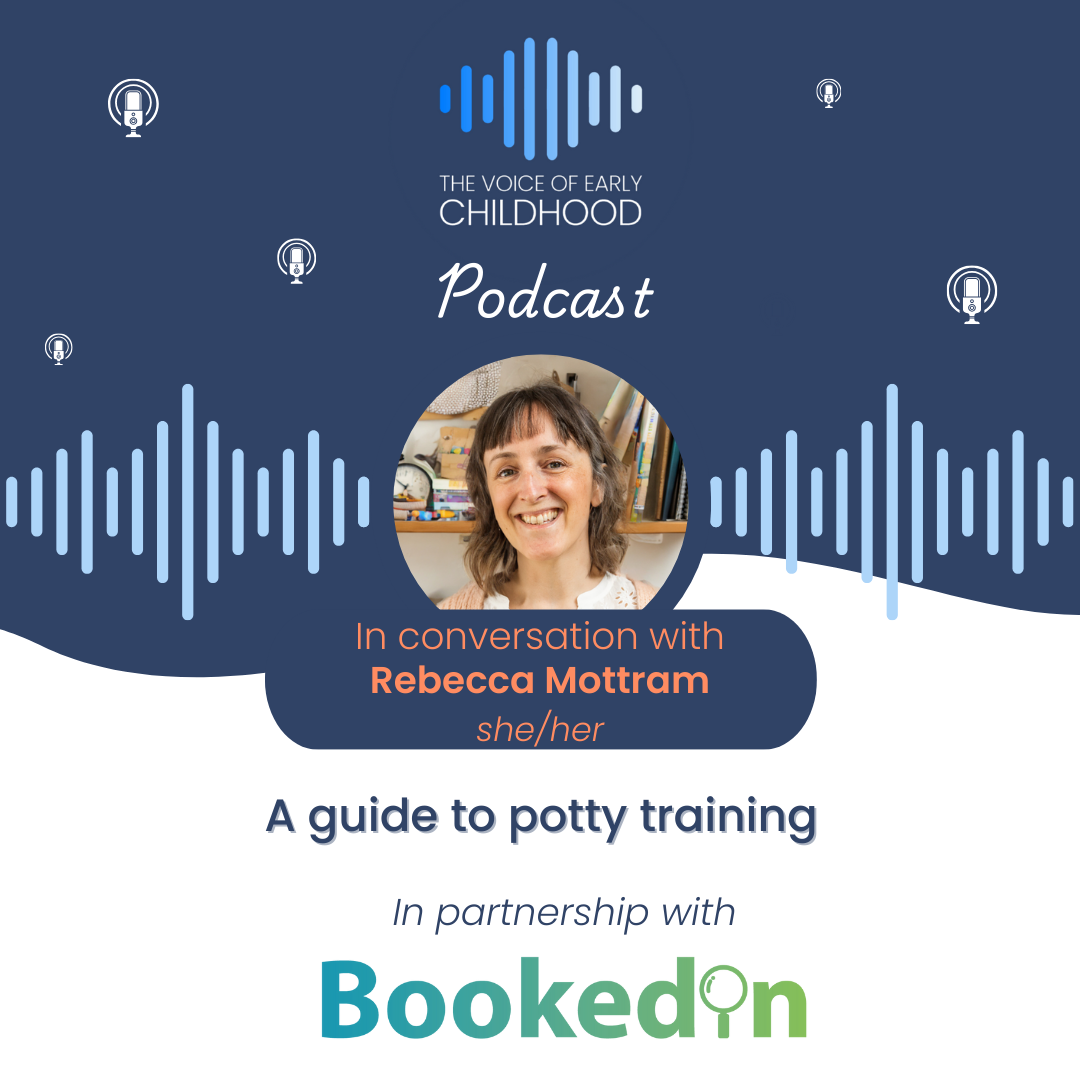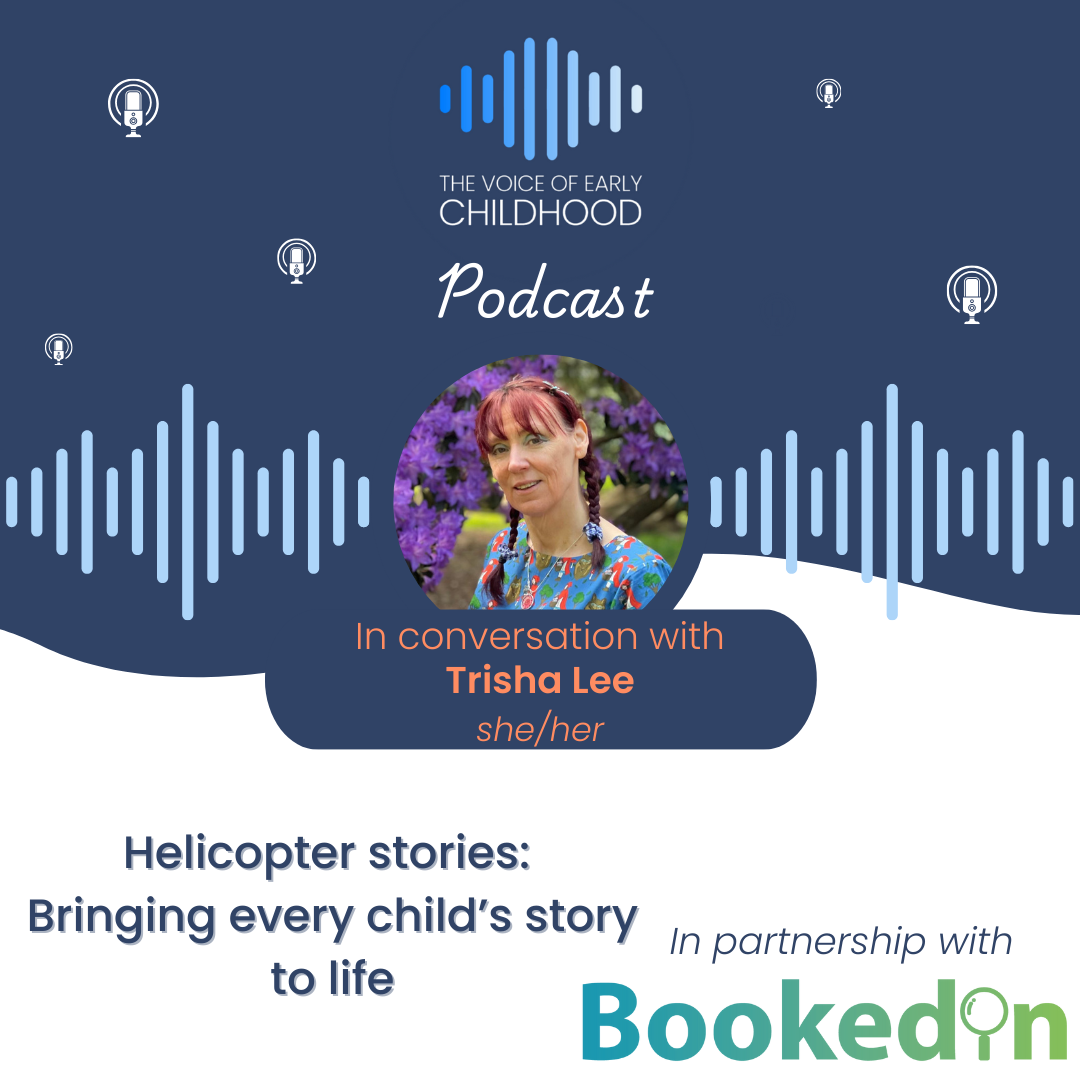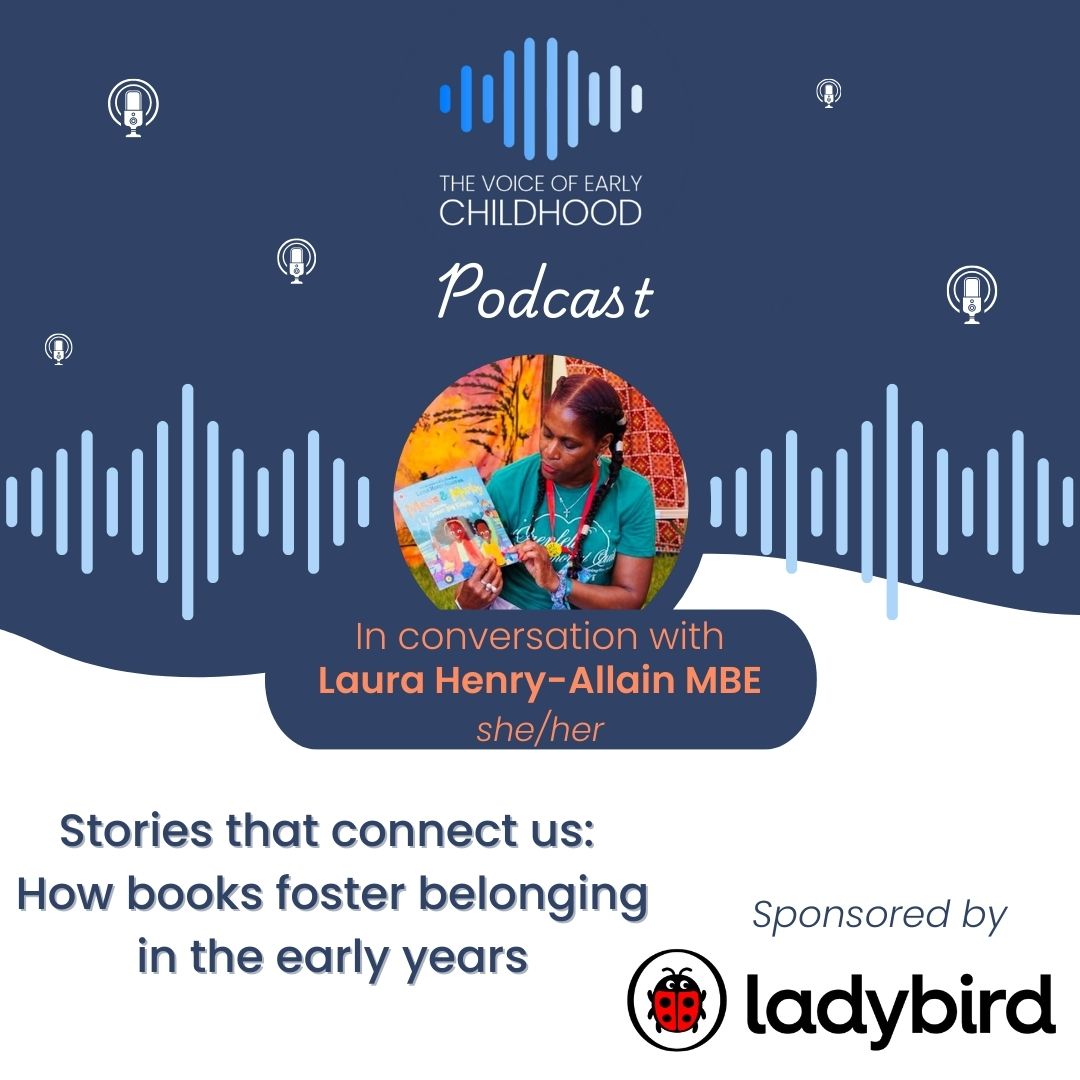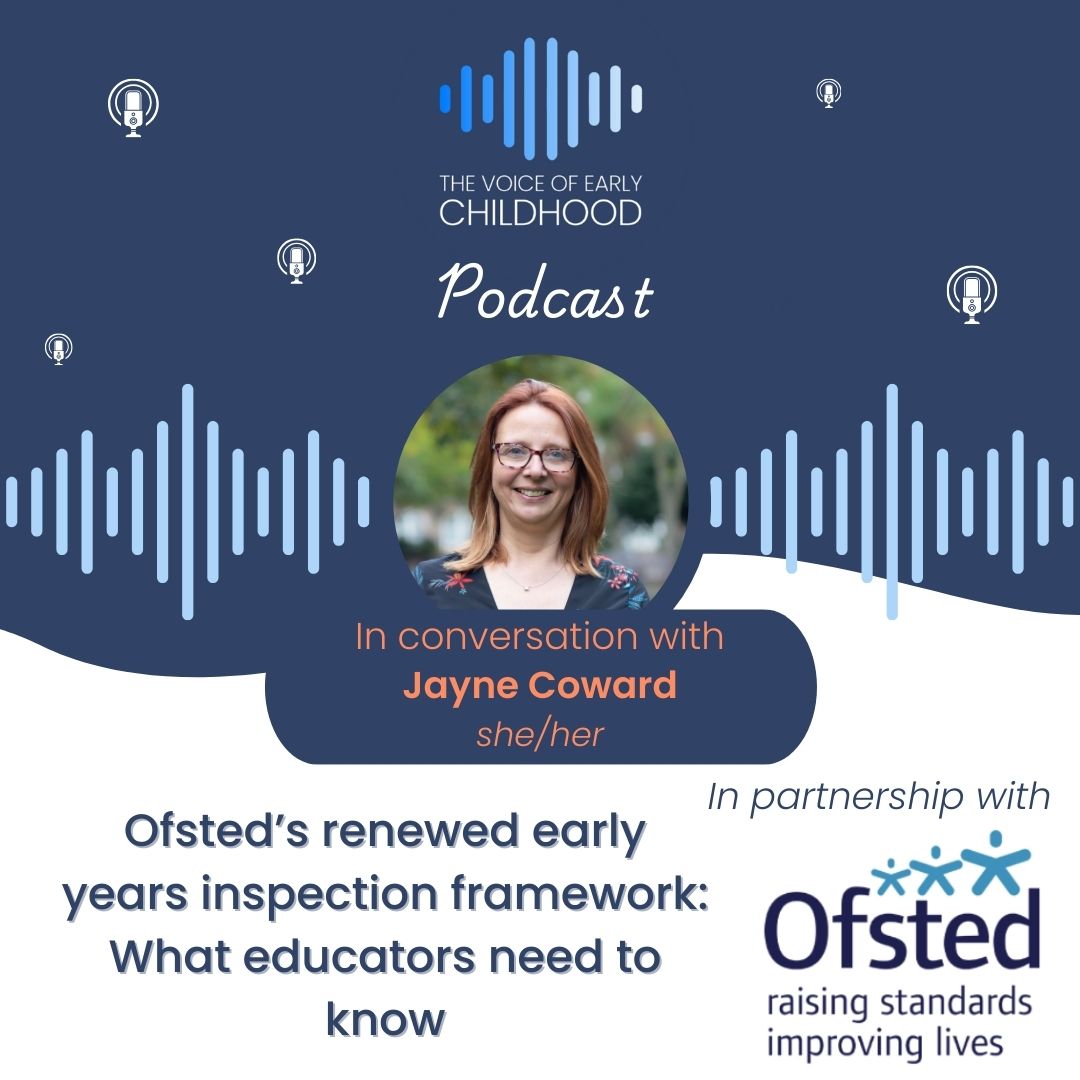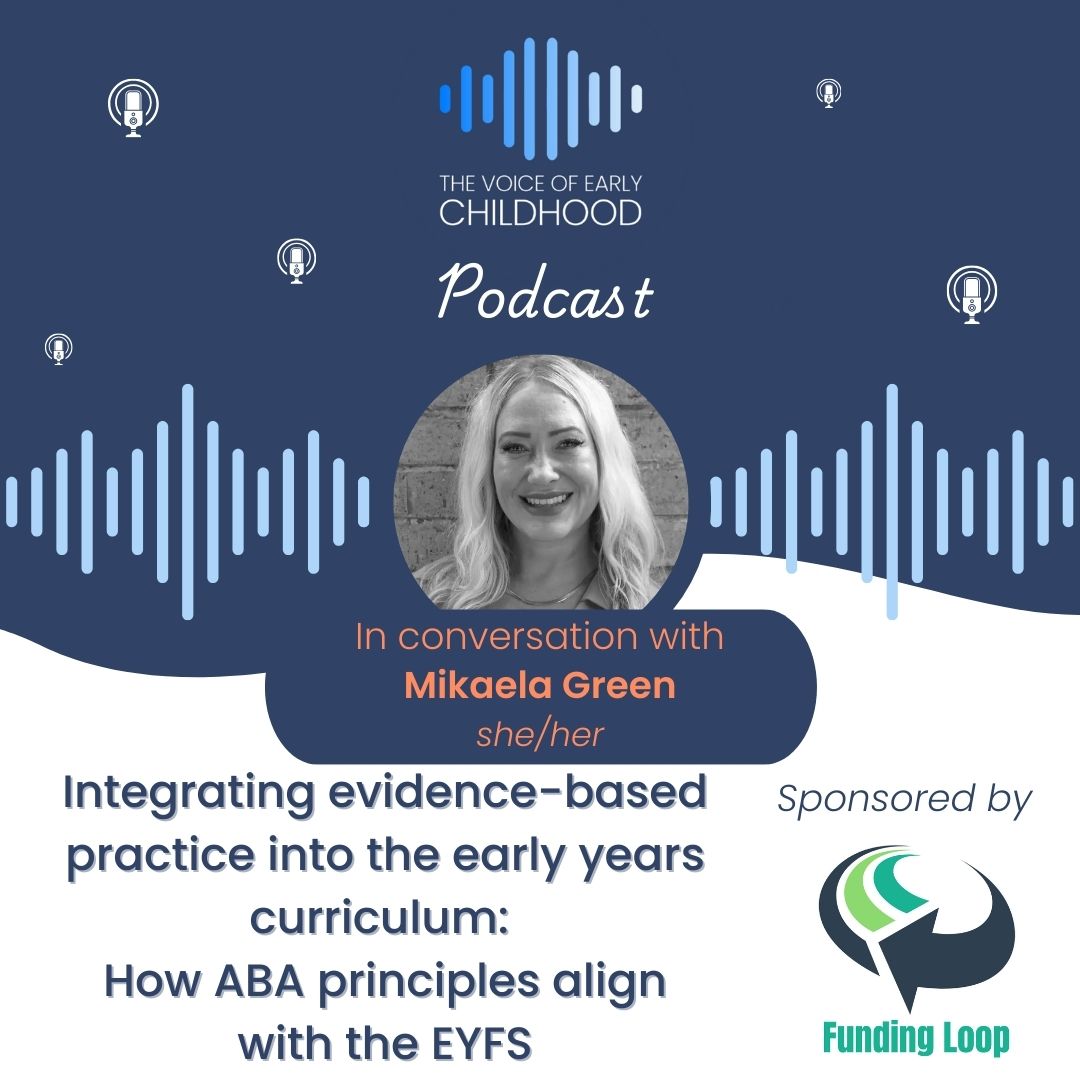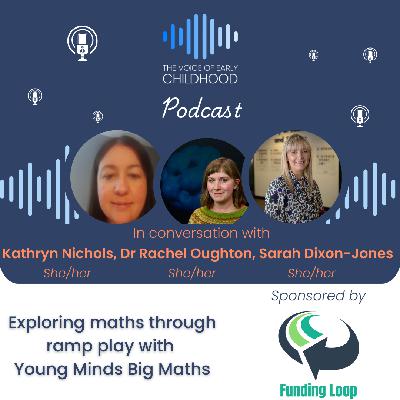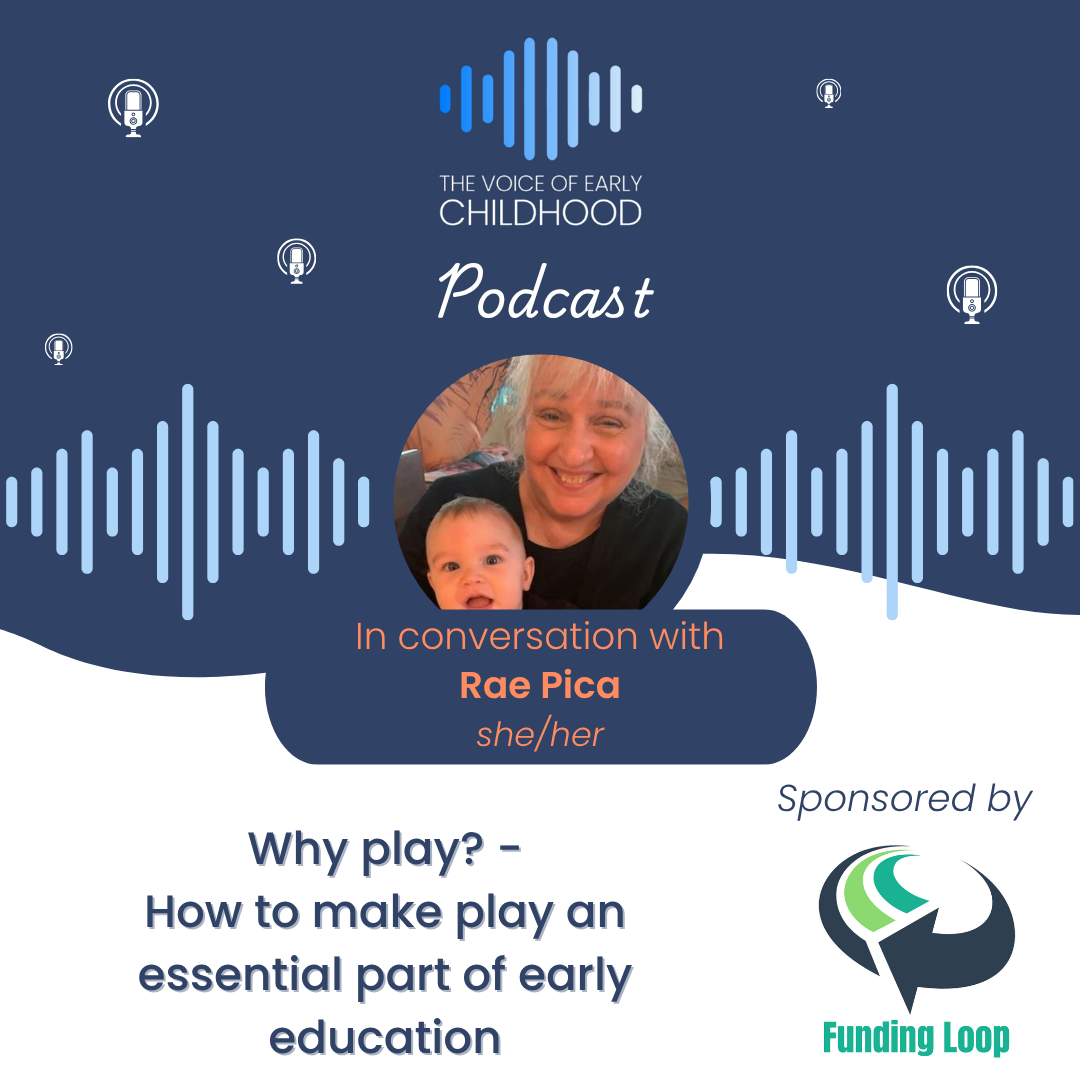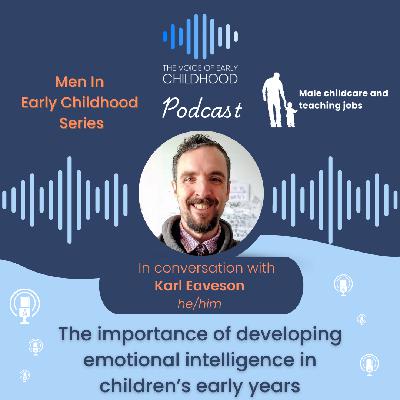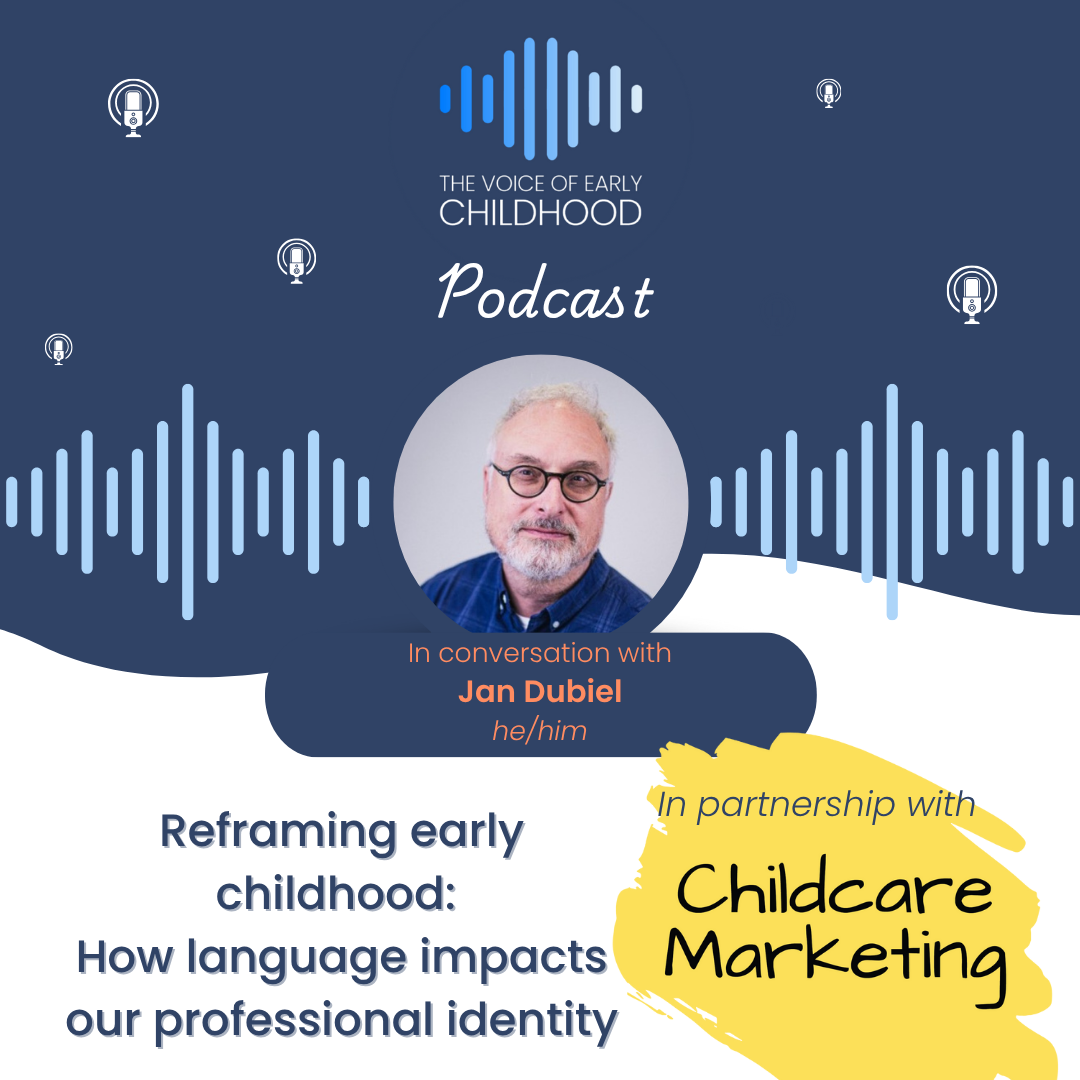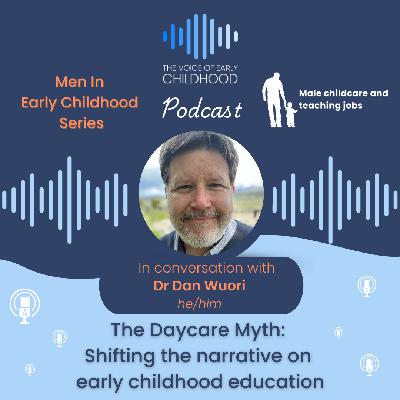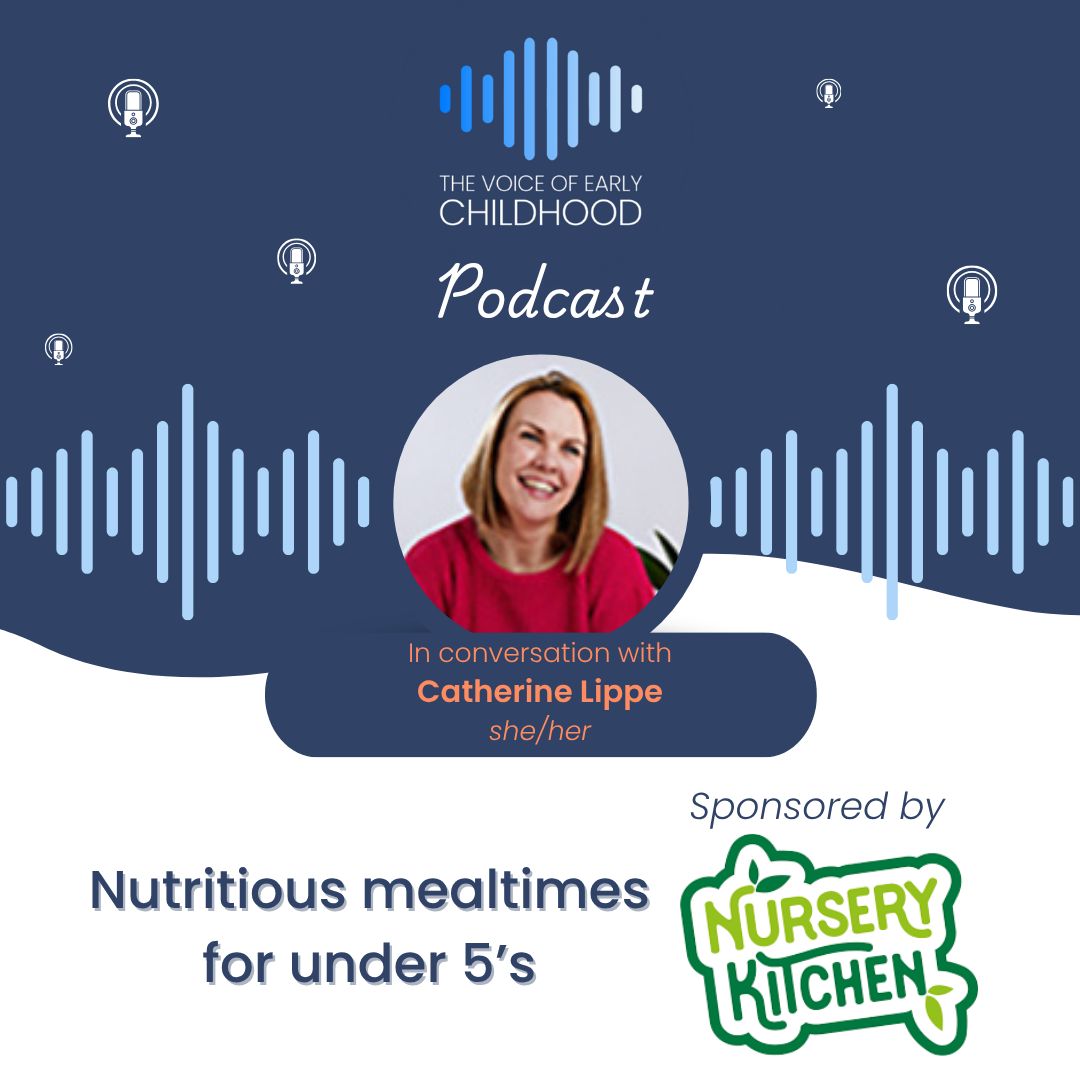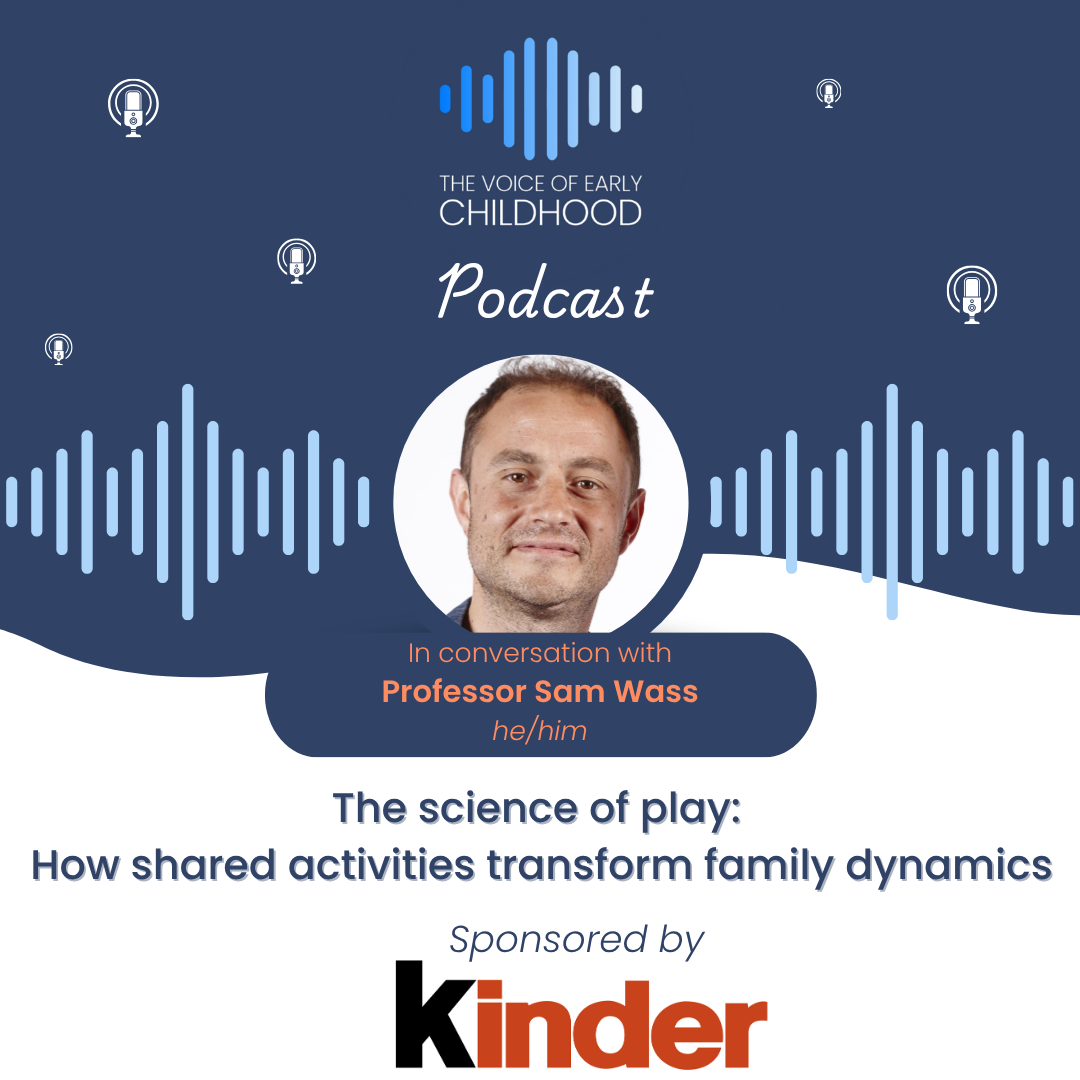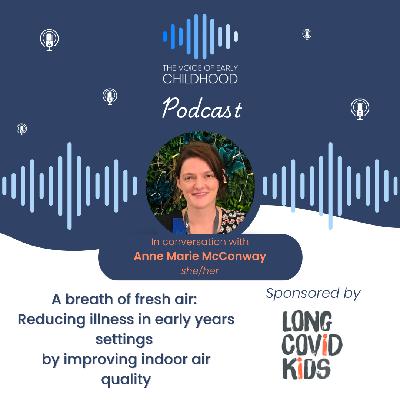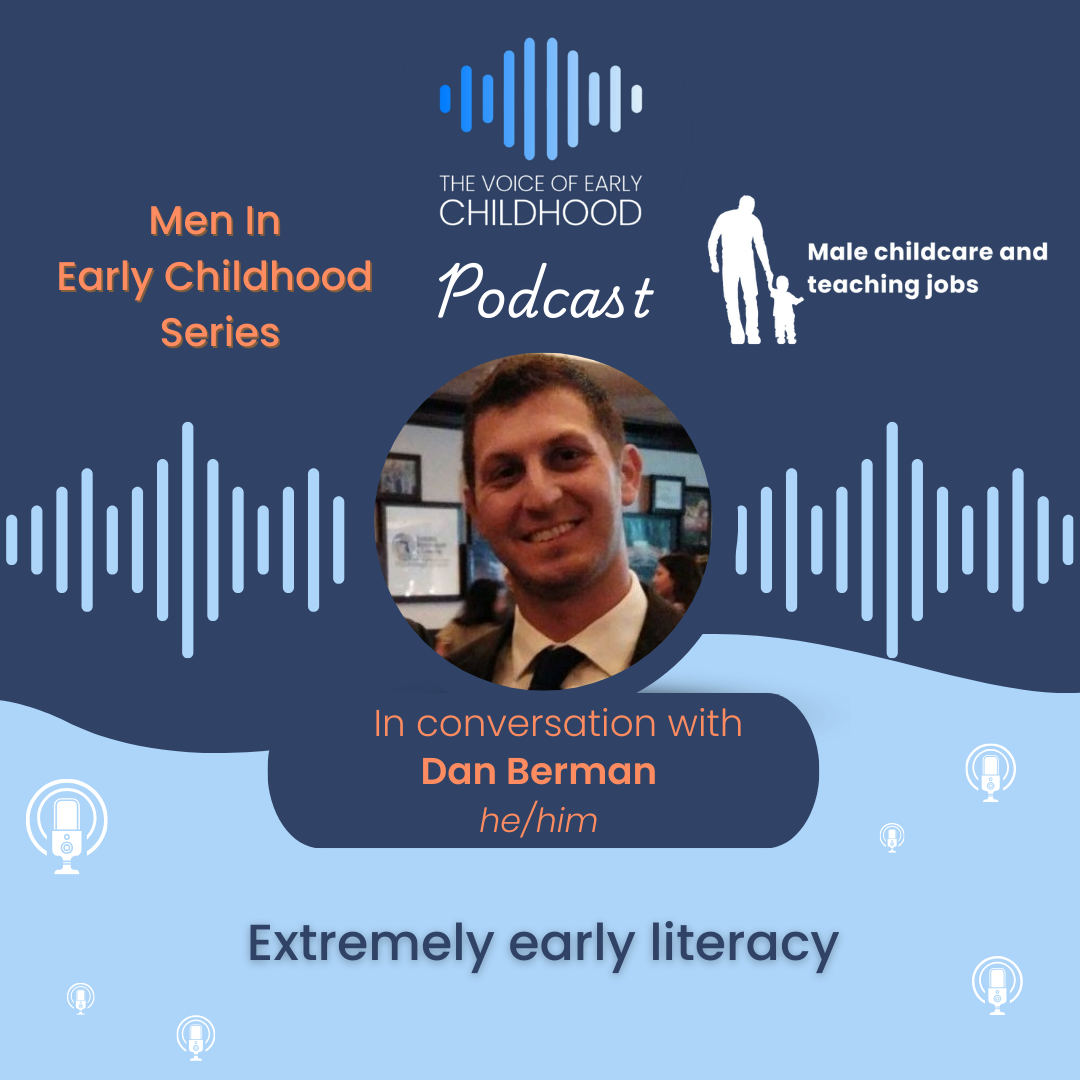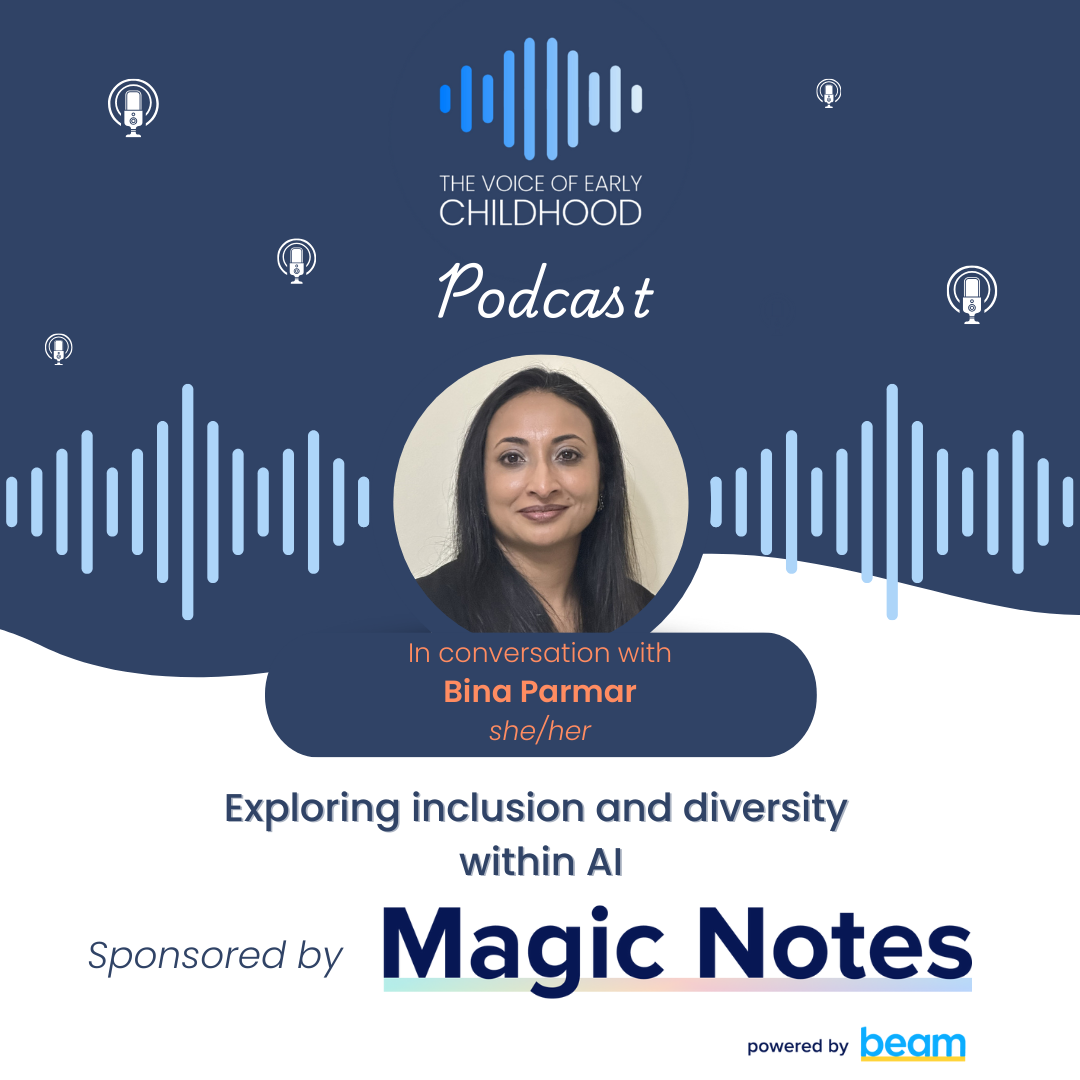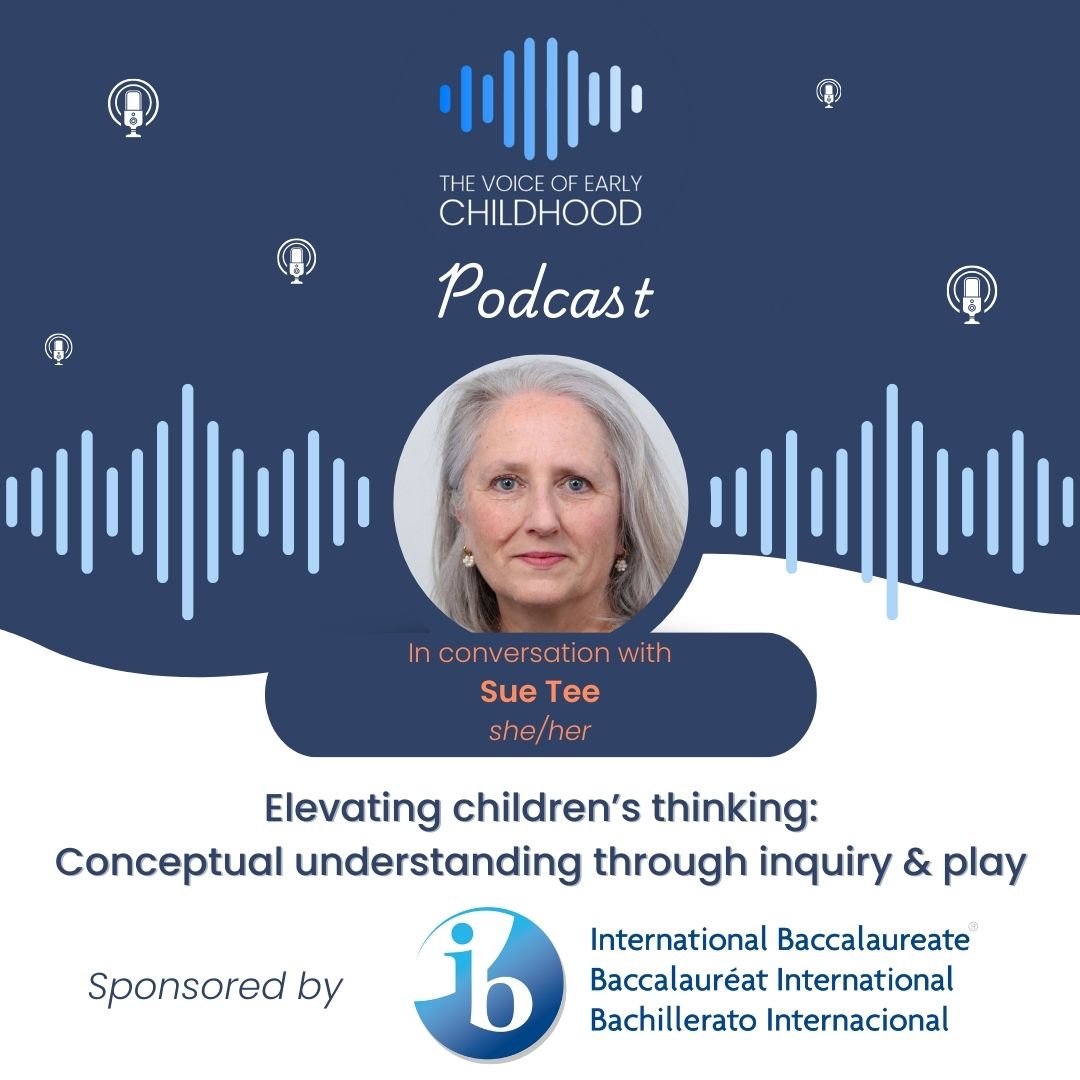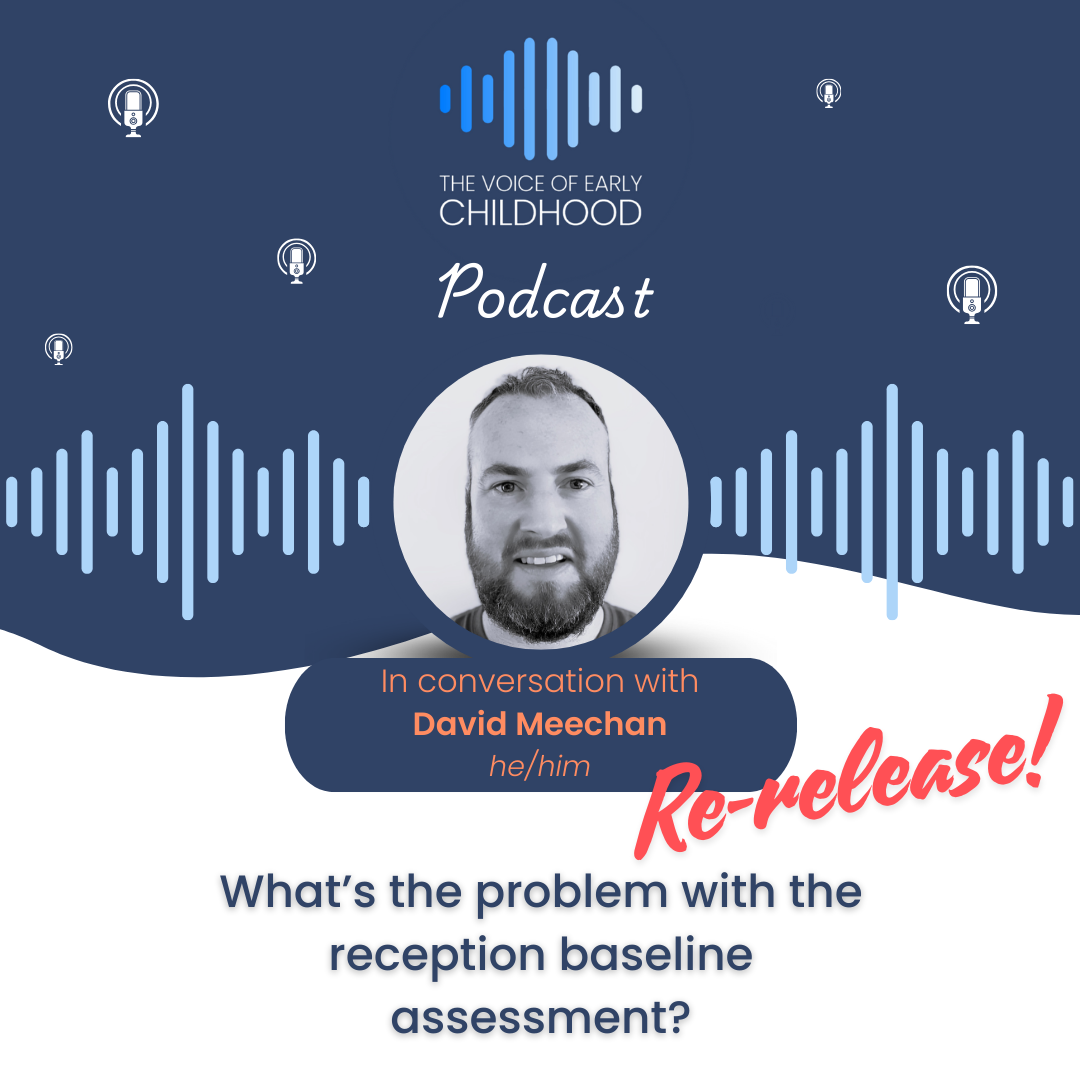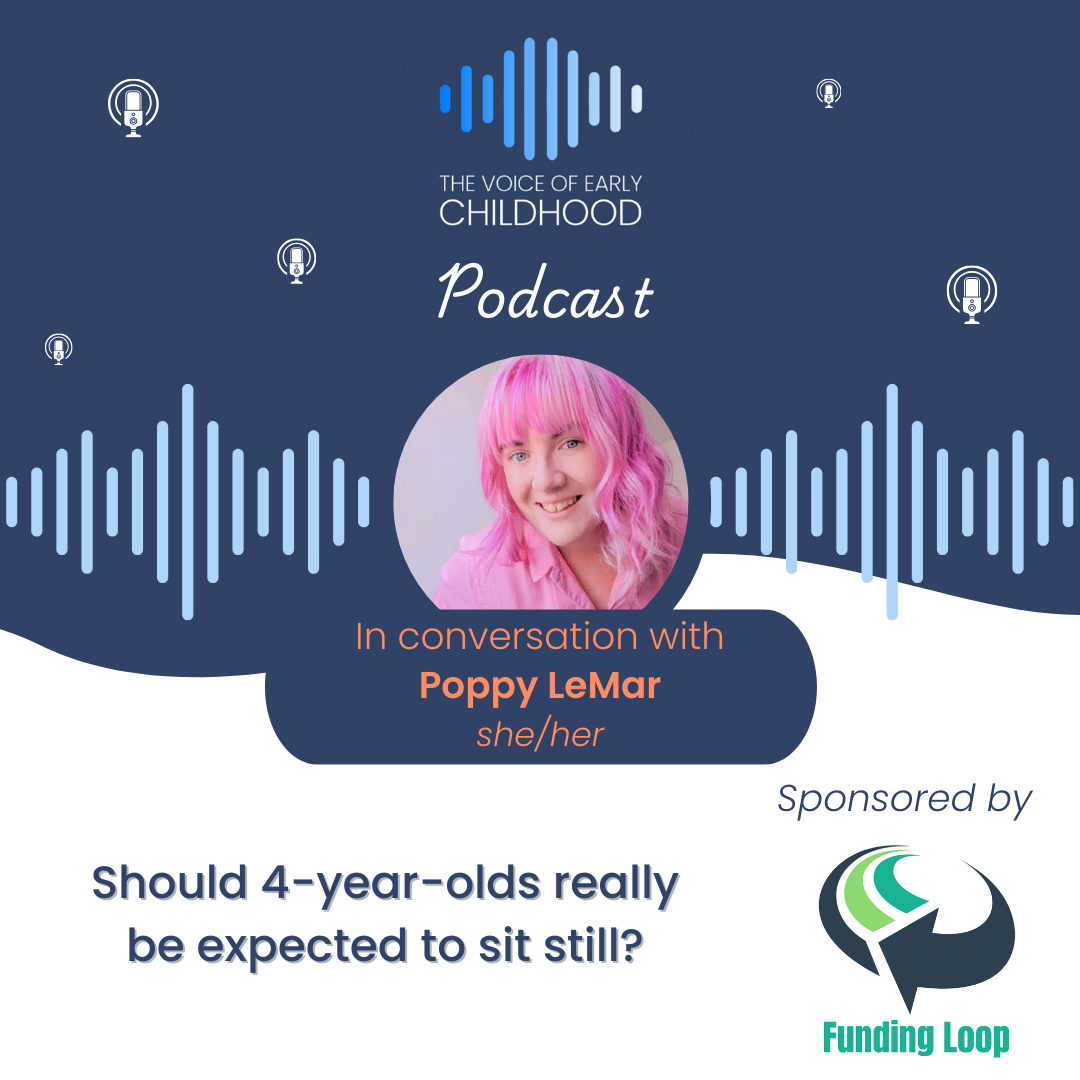Discover The Voice of Early Childhood
The Voice of Early Childhood

The Voice of Early Childhood
Author: The Voice of Early Childhood
Subscribed: 17Played: 247Subscribe
Share
Copyright © 2023 The Voice of Early Childhood
Description
The Voice of Early Childhood Podcast: involving you in thought-provoking discussions around early childhood. This weekly podcast brings you discussion, reflection, debate and a window into the minds of advocates working with our young leaders of tomorrow.
150 Episodes
Reverse
The new government-backed Potty Training Guide moves away from the old 'readiness' model and promotes early, gradual learning and preparation from infancy. This article and podcast episode explore what the guidance means for families and settings, why coming out of nappies should be the final step in learning, and how practitioners and parents/carers can support confident, healthy toilet learning. Read the article here: https://thevoiceofearlychildhood.com/a-guide-to-potty-training/ This episode is in partnership with BookedIn BookedIn is a CPD booking platform that connects organisations with verified speakers, trainers and consultants – so you can find the right fit faster, based on your brief, audience and outcomes. You can discover, compare, and manage bookings in one place – designed to help you book with more clarity and confidence. Whether you're booking CPD or are a speaker yourself, they're opening early access soon, and if you want to be first to hear when it's live, join the waiting list NOW! To find out more and sign up to the wait list visit: https://waitlist.bookedin.online/ Our 2026 conference info & tickets: https://thevoiceofearlychildhood.com/early-years-conference-2026/ Listen to more: If you enjoyed this episode, you might also like: ● Tummy time is an outdated notion, by Christine Wilkinson & Rachel Tapping: https://thevoiceofearlychildhood.com/tummy-time-is-an-outdated-notion/ ● Starting school: Supporting transitions to reception and key stage 1, by Delyth Linacre: https://thevoiceofearlychildhood.com/starting-school-supporting-transitions-to-reception-and-key-stage-1/ Get in touch and share your voice: Do you have thoughts, questions or feedback? Get in touch here! – https://thevoiceofearlychildhood.com/contact/ Episode break down: 00:00 – Welcome & guest introduction: Rebecca Mottram 03:10 – Why potty learning is in the spotlight & new England guidance overview 07:10 – Reframing potty learning as a developmental journey (moving away from "ready") 11:45 – "Nappies off" as the final step: capability, gradual skill-building, avoiding sudden transitions 17:05 – Practical foundations before nappies come off: sensory feedback & bathroom routines 20:50 – Rebecca's new book Positively Potty 22:10 – Nappies: cloth vs disposable & using nappies "mindfully" 25:55 – When should children be out of nappies? 29:20 – Starting school: curiosity over judgement 34:30 – Working in partnership with parents: earlier, joined-up support 36:40 – Regression and plateaus: learning isn't linear 39:10 – Motivating without treats: rewarding effort and engagement 41:20 – Play as the engine of potty learning: props, stories, role play 43:25 – Accidents & language: staying neutral; inclusive toileting practice For more episodes and articles visit The Voice of Early Childhood website: https://www.thevoiceofearlychildhood.com
This reflective piece explores the power of Helicopter Stories to unlock children's thinking, imagination and emotional expression. Through real-life examples, it illustrates how storytelling can offer deep insight into children's inner worlds, build community, and provide an inclusive, child-centred approach where every voice is valued and every story matters. Read the article here: https://thevoiceofearlychildhood.com/helicopter-stories-bringing-every-childs-story-to-life/ This episode is in partnership with BookedIn BookedIn is a CPD booking platform that connects organisations with verified speakers, trainers and consultants – so you can find the right fit faster, based on your brief, audience and outcomes. You can discover, compare, and manage bookings in one place – designed to help you book with more clarity and confidence. Whether you're booking CPD or are a speaker yourself, they're opening early access soon, and if you want to be first to hear when it's live, join the waiting list NOW! To find out more and sign up to the wait list visit: https://waitlist.bookedin.online/ Our 2026 conference info & tickets: https://thevoiceofearlychildhood.com/early-years-conference-2026/ Listen to more: If you enjoyed this episode, you might also like: · Stories that connect us: How books foster belonging in the early years, by Laura Henry-Allain MBE – https://thevoiceofearlychildhood.com/stories-that-connect-us-how-books-foster-belonging-in-the-early-years-2/ · The value of storytelling, by Olivia Corbin-Phillip – https://thevoiceofearlychildhood.com/the-value-of-storytelling/ Get in touch and share your voice: Do you have thoughts, questions or feedback? Get in touch here! – https://thevoiceofearlychildhood.com/contact/ Episode break down: 00:00 – Welcome and introductions 02:18 – What Helicopter Stories is and where it comes from (Vivian Gussin Paley) 04:40 – The magpie story and You can't say you can't play 06:31 – How Trisha met Vivian and their correspondence/friendship 09:04 – Why Trisha wrote the "how-to" book and the aim for global reach 10:30 – Key benefits: belonging, community, and knowing children more deeply 15:02 – Higher order thinking: representing characters without adult modelling 16:47 – Example story: "cake… house… eating…" and what acting-out reveals 18:50 – Mosaic approach / "hundred languages": communication beyond words 20:15 – Why verbatim matters & one-word stories ("Dog") 22:26 – Celebrating the poetry of children's language (Andre's story) 24:21 – When adults over-correct: protecting children's confidence as storytellers 25:36 – Challenging themes and possible disclosures: responding appropriately 28:35 – Story as processing: why storytelling can feel therapeutic 30:42 – Age range: who Helicopter Stories works for 32:04 – Getting started: practical steps, frameworks, and resources 34:03 – Growth of Helicopter Stories: where it's being used 35:10 – Closing reflections For more episodes and articles visit The Voice of Early Childhood website: https://www.thevoiceofearlychildhood.com
In early childhood, stories are more than words on a page. They are bridges—between experiences, identities, and possibilities. This idea sits at the heart of a powerful conversation with Laura Henry-Allain MBE: award-winning early education specialist, author, and creator of the ground-breaking CBeebies series JoJo and Gran Gran. In this podcast episode, Laura shares her insights on the transformative potential of books in early childhood settings, and how storytelling can offer every child a sense of belonging. Read the article here: https://thevoiceofearlychildhood.com/stories-that-connect-us-how-books-foster-belonging-in-the-early-years/ This episode is sponsored by Ladybird Books: We make growing up the best story ever! From your baby's first book to starting school, at Ladybird we publish something for every milestone. Discover a range of your little one's favourite characters, from Peppa Pig to Topsy and Tim, and much more. To find out more visit: https://www.penguin.co.uk/discover/ladybird Our 2026 conference info & tickets: https://thevoiceofearlychildhood.com/early-years-conference-2026/ Listen to more: If you enjoyed this episode, you might also like: · The value of storytelling, by Olivia Corbin-Phillip, https://thevoiceofearlychildhood.com/the-value-of-storytelling/ · Extremely early literacy, by Dan Berman, https://thevoiceofearlychildhood.com/extremely-early-literacy/ Get in touch and share your voice: Do you have thoughts, questions or feedback? Get in touch here! – https://thevoiceofearlychildhood.com/contact/ Episode break down: 00:00 – 2026 Conference: Laura Henry-Allain MBE as keynote speaker 02:20 – Introducing Laura Henry-Allain MBE 06:10 – Why books matter: emotion, curiosity, access, and "windows" for children 08:30 – Representation and belonging: children seeing themselves in stories 11:10 – Books on a budget: second-hand options + widening access 13:10 – Beyond the book corner: placing books across the setting 15:10 – Books at home: everyday reading and communication 17:10 – Supporting families: lending libraries, story sacks, and building confidence 20:10 – Practical tip: tote bag "reading pack" instead of defaulting to screens 23:10 – Laura's "reading is everywhere" poster: what it is & how settings use it 26:00 – Balancing technology: audio stories and listening skills 28:30 – Laura's publishing journey: beginnings with her grandmother 31:20 – Writing life: timelines for publishing, working ahead, and varied roles 34:30 – Author visits: modelling storytelling 36:20 – Complex themes: why children are not "too young" 38:10 – Talking about race and difference 41:50 – Practice example: self-portraits, skin-tone resources, and sensitive reflection 44:30 – Intentional inclusion: planning, provocations, and the "global village" 47:20 – 2026: national year of reading & Laura's keynote plans 49:10 – TVOEC bookshelf project: using books to support complex conversations 50:10 – Laura's podcast: author interviews + extension activities/resources 52:10 – Mirrors, windows and sliding doors: widening perspectives through books 54:10 – Closing reflections For more episodes and articles visit The Voice of Early Childhood website: https://www.thevoiceofearlychildhood.com
The early childhood community in England is experiencing a significant shift in how early years provision is inspected and understood. Ofsted's renewed early years inspection framework, now in place, shapes this episode and article. Drawing on a conversation with Jayne Coward from Ofsted, it explores what has changed, what remains central, and what this means for educators, children and families. For the full article and documents mentioned in the episode visit: https://thevoiceofearlychildhood.com/ofsteds-renewed-early-years-inspection-framework-what-educators-need-to-know/ This episode is in partnership with Ofsted. You can hear more from Ofsted at our 2026 conference: https://thevoiceofearlychildhood.com/early-years-conference-2026/ Listen to more: If you enjoyed this episode, you might also like: · The case for systemic change in Ofsted's approach, by Lucy Lewin: https://thevoiceofearlychildhood.com/the-case-for-systemic-change-in-ofsteds-approach/ · Ofsted's and the DfE's voices must be heard whether we like them or not… by Adam Marycz: https://thevoiceofearlychildhood.com/ofsteds-and-the-dfes-voices-must-be-heard-whether-we-like-them-or-not/ · Ofsted: 'Sole arbiter of quality', by Dr Sue Allingham: https://thevoiceofearlychildhood.com/ofsted-sole-arbiter-of-quality/ Get in touch and share your voice: Do you have thoughts, questions or feedback? Get in touch here! – https://thevoiceofearlychildhood.com/contact/ Episode break down: 00:00 – Welcome and topic introduction 03:10 – What is the renewed inspection framework? 04:30 – Putting babies and children first 06:05 – The EYFS as the backbone of inspection 07:20 – Moving from fear to collaboration 08:40 – Consultation, pilots and feedback 10:00 – Inspector expertise and training 11:20 – Planning call and the end of the learning walk 13:00 – Professional dialogue during inspection 14:05 – Understanding context and community 15:30 – Curriculum, pedagogy and play 17:20 – Early years toolkit examples 19:05 – Conference reminder and podcast break note 20:00 – Workload, autonomy and 'not performing for Ofsted' 21:45 – Managing nerves and pressure 23:10 – Paperwork and what inspectors look at 24:10 – Talking with staff, key persons and apprentices 25:40 – Final message to educators For more episodes and articles visit The Voice of Early Childhood website: https://www.thevoiceofearlychildhood.com
This article and podcast episode explore how Applied Behaviour Analysis (ABA) principles can be understood through EYFS language and practice. Mikaela Green, clinical director of therapeutic services and principal of First Bridge School, shows how strategies such as breaking learning into small steps, celebrating success, and creating enabling environments align seamlessly with EYFS priorities. Drawing on research evidence and examples from First Bridge Education, Mikaela highlights how educators can use evidence-based approaches to motivate children, reduce barriers, and support inclusive learning. Read the article here: https://thevoiceofearlychildhood.com/integrating-evidence-based-practice-into-the-early-years-curriculum-how-aba-principles-align-with-the-eyfs/ This episode is sponsored by Funding Loop Funding Loop automates the process for nurseries of collecting funding forms from parents and typing that information into council portals. Funding Loop is used by over 2000 nurseries including over 80% of the top 25 nursery chains in the UK including Busy Bees. To find out more visit: https://www.fundingloop.co.uk/home Our 2026 conference info & tickets: https://thevoiceofearlychildhood.com/early-years-conference-2026/ Listen to more: If you enjoyed this episode, you might also like: · Supporting regulation in the early years: A progressive approach, by Jill Jones and Rebecca Martin - https://thevoiceofearlychildhood.com/supporting-regulation-in-the-early-years-a-progressive-approach/ · Elevating children's thinking: Conceptual understanding through inquiry and play, by Sue Tee - https://thevoiceofearlychildhood.com/elevating-childrens-thinking-conceptual-understanding-through-inquiry-and-play/ Get in touch and share your voice: Do you have thoughts, questions or feedback? Get in touch here! – https://thevoiceofearlychildhood.com/contact/ Episode breakdown: 00:00 – Podcast intro and welcome 01:39 – Introducing guest Michaela Green and her roles 01:52 – Michaela's background and experience in early intervention and ABA 03:02 – Defining applied behaviour analysis (ABA): a science of learning 04:13 – ABA's history with autism, misconceptions and negative connotations 05:07 – ABA beyond autism: applications in health, sport and dementia 06:40 – Unpicking ABA principles through the EYFS: enabling environments and stimulus control 08:38 – Partnerships with parents: why family involvement is essential 09:40 – Following children's motivation and building learning around their interests 11:10 – Reinforcement, resilience and critical thinking in early learning 13:45 – Intrinsic versus extrinsic motivation and the role of rewards 14:18 – Teaching children to "like new things" and widening their worlds 18:07 – Why skilled clinical oversight matters and risks of poor implementation 19:23 – Why ABA is not a pick-up-and-go approach for settings 21:39 – First steps for settings interested in ABA and when it may be needed 22:16 – Distinguishing children who need intensive ABA from those who do not 25:07 – Practical universal strategies: predictable routines and calmer transitions 26:12 – Using visual supports and objects of reference to aid understanding 27:32 – Labelling resources and supporting independent choice in the environment 28:25 – Calm spaces, regulation and supporting children overwhelmed by noise 28:42 – Following interests (like cars) to help children feel safe and secure 29:38 – Recognising good early years practice and natural links with the EYFS 30:14 – How ABA and the EYFS framework complement one another in practice 31:07 – Combining specific ABA targets with a rich, play-based EYFS environment 33:06 – Identifying children who may benefit from more intensive, targeted teaching 34:16 – Red flags at the two-year check and why "wait and see" is not enough 37:33 – What one-to-one ABA teaching can look like for an individual child 39:02 – Example: teaching imitation and clapping through fun, motivating activities 41:00 – Using ongoing assessment and data to check whether learning is happening 41:44 – Critical consideration one: individual differences and personalised programmes 45:16 – Critical consideration two: risk of overstructure and keeping play meaningful 46:34 – Balancing intensive teaching with natural environment learning 48:11 – Critical consideration three: ethical implementation and moving beyond compliance 49:20 – ABA's historical context, harms of past practices and how the field has evolved 52:28 – Evidence versus practice: strong research base, regulation and quality control 55:15 – ABA as a supportive lens, not a replacement for holistic EYFS practice 56:03 – Changing environments, not children: using ABA to ease transitions 57:29 – Host reflections on myth-busting, critical thinking and environment-focused practice 58:00 – Open-door invitation to visit First Bridge and see the approach in action 58:22 – Where to find Michaela's article and episode For more episodes and articles visit The Voice of Early Childhood website: https://www.thevoiceofearlychildhood.com
In Young Minds Big Maths, university mathematicians and early years educators collaborate to explore mathematics. We discuss how the project led us to create a booklet to help educators discover maths through play in their settings. The booklet uses real-life examples of ramp play—something children love—to show how building and experimenting with ramps reveals rich mathematical ideas. Read the article here: https://thevoiceofearlychildhood.com/exploring-maths-through-ramp-play-with-young-minds-big-maths/ This episode is sponsored by Funding Loop Funding Loop automates the process for nurseries of collecting funding forms from parents and typing that information into council portals. Funding Loop is used by over 2000 nurseries including over 80% of the top 25 nursery chains in the UK including Busy Bees. To find out more visit: https://www.fundingloop.co.uk/home Our 2026 conference info & tickets: https://thevoiceofearlychildhood.com/early-years-conference-2026/ Listen to more: If you enjoyed this episode, you might also like: · Elevating children's thinking: Conceptual understanding through inquiry and play, by Sue Tee - https://thevoiceofearlychildhood.com/elevating-childrens-thinking-conceptual-understanding-through-inquiry-and-play/ · Promoting STEAM in early years: It's easier than you think! By Paula Walshe - https://thevoiceofearlychildhood.com/promoting-steam-in-early-years-its-easier-than-you-think/ · What's the problem with tuff tray maths? By Shardi Vaziri - https://thevoiceofearlychildhood.com/whats-the-problem-with-tuff-tray-maths/ Get in touch and share your voice: Do you have thoughts, questions or feedback? Get in touch here! – https://thevoiceofearlychildhood.com/contact/ Episode break down: Episode breakdown: 00:00 – Welcome & podcast intro 01:20 – Setting the scene: young minds, big maths through play 01:42 – Meet Rachel, Catherine and Sarah 02:24 – About the nursery schools and community context 02:51 – How the collaboration with a mathematician began 06:27 – Maths as the "dirtiest lens" in the EYFS 07:25 – Starting with patterns in nature and children's interest in circles 09:55 – Meeting the mathematicians & a new model of CPD 16:37 – Moving into ramp play as a focus for maths learning 17:11 – Ramp play across different settings 22:54 – The rich mathematics in ramp play (angles, variables, data) 26:55 – Children's own ways of measuring and defining 32:28 – Children's questions, language and ongoing learning for educators 35:14 – Being brave: advice for starting collaborations 40:34 – Three key ideas from the project 41:28 – Ramp play booklet 41:51 – Closing reflections & invitation to share your own maths-through-play stories For more episodes and articles visit The Voice of Early Childhood website: https://www.thevoiceofearlychildhood.com
Play is not a luxury—it's a biological necessity. From early childhood through adulthood, play fuels cognitive growth, emotional resilience, social competence, and physical development. This article and podcast episode explore why play matters, how it shapes learning, and what educators and caregivers must consider to protect and promote it. Read the article here: https://thevoiceofearlychildhood.com/why-play-how-to-make-play-an-essential-part-of-early-education/ This episode is sponsored by Funding Loop Funding Loop automates the process for nurseries of collecting funding forms from parents and typing that information into council portals. Funding Loop is used by over 2000 nurseries including over 80% of the top 25 nursery chains in the UK including Busy Bees. To find out more visit: https://www.fundingloop.co.uk/home Our 2026 conference info & tickets: https://thevoiceofearlychildhood.com/early-years-conference-2026/ Listen to more: If you enjoyed this episode, you might also like: · Elevating children's thinking: Conceptual understanding through inquiry and play, by Sue Tee - https://thevoiceofearlychildhood.com/elevating-childrens-thinking-conceptual-understanding-through-inquiry-and-play/ · Advocacy, agency and rights in early childhood, by Dr Jo Albin-Clark and Dr Nathan Archer - https://thevoiceofearlychildhood.com/advocacy-agency-and-rights-in-early-childhood/ Get in touch and share your voice: Do you have thoughts, questions or feedback? Get in touch here! – https://thevoiceofearlychildhood.com/contact/ Episode break down: 00:00 – Welcome and episode introduction 01:36 – Framing the central question: why play? 02:37 – Play as nature's plan for learning and why sitting harms 04:11 – Parental pressure, misinformation and the 'earlier is better' myth 05:03 – A global pushdown of academics in early childhood (US and UK) 05:47 – Educators torn between child development knowledge and policy demands 06:29 – Policymakers' power and Alfie Kohn's analogy 08:22 – Losing play from five onwards and revisiting child development 09:41 – Free play as child-initiated, child-chosen learning 10:24 – Guided play and supporting self-regulation (the statues game) 11:17 – Joy, fun and intrinsic motivation in learning 11:45 – Outdoor, nature and cooperative play versus competition 13:37 – The brevity of childhood and 'what is the hurry?' 14:24 – Knowing when to step back in children's conflicts 15:49 – Understanding and valuing rough and tumble play 16:07 – Risky or adventurous play and learning to assess risk 17:39 – Reading cues for when to intervene in rough and tumble play 18:33 – Rethinking 'calm down' and supporting different arousal states 20:22 – Play as a way to express and process emotions 21:47 – Co-creating rules, personal space and managing movement and sound 23:16 – Developmental readiness for sitting still (around six) 24:10 – Unrealistic expectations of three-year-olds (sitting still and pencil grip) 24:47 – Behaviour as a response to developmental mismatch and lack of movement 25:22 – Fidgeting, movement and alternative ways of paying attention 27:11 – Children who 'don't know how to play' and aggressive play 28:54 – Modelling, scaffolding and gently redirecting play 29:36 – Using invitations and provocations to deepen play 31:55 – 'Play Matters' and reconnecting with theory, research and advocacy 33:32 – Remembering our own childhood joy as a guide for practice 35:35 – Big body play, physical health and strong bodies 36:27 – Integrating literacy and maths through active, playful experiences 37:04 – Multi-sensory, embodied learning and why it sticks 39:13 – Play as integrated, holistic learning across content areas 40:39 – Reflective questions for educators about honouring play 41:33 – Small steps for change and everyday acts of advocacy For more episodes and articles visit The Voice of Early Childhood website: https://www.thevoiceofearlychildhood.com
Emotional intelligence refers to the ability to recognise, understand and manage one's own emotions whilst also being able to empathise with and respond appropriately to the emotions of others. This article and podcast episode delve into this subject to explore what we can do to support emotional intelligence in the earliest years. Read the article here: https://thevoiceofearlychildhood.com/the-importance-of-developing-emotional-intelligence-in-childrens-early-years/ This episode is in partnership with Male Childcare and Teaching Jobs. Male Childcare and Teaching Jobs advocate for greater male participation in education and caregiving roles, offering support and guidance to enhance gender inclusion in nurseries and schools. To find out more visit: https://malechildcareandteachingjobs.co.uk/ Listen to more: If you enjoyed this episode, you might also like to hear more at https://thevoiceofearlychildhood.com/articles/men-in-early-childhood/ Our 2026 conference info & tickets: https://thevoiceofearlychildhood.com/early-years-conference-2026/ Get in touch and share your voice: Do you have thoughts, questions or feedback? Get in touch here! – https://thevoiceofearlychildhood.com/contact/ Episode break down: 00:00 – Welcome! 02:00 – Karl's personal journey 10:00 – Why early years? 13:00 – Settling in as a natural process 16:00 – Meeting interests and needs 17:00 – Recognising children's emotions 19:00 – Following an approach or ethos 21:00 – Supporting parents as well as children 24:00 – Stories to support complex feelings 27:00 – Checking in on all children 28:00 – Children with special educational needs 31:00 – Adapting to individual needs 35:00 – Validating children's feelings For more episodes and articles visit The Voice of Early Childhood website: https://www.thevoiceofearlychildhood.com
There has never been a more urgent time to reflect on how we, as a profession, present ourselves to the world. The early childhood community is rich in knowledge, experience and deep commitment to children's learning and wellbeing. Yet, we continue to wrestle with misunderstanding, mistrust and misrepresentation—externally and, at times, internally. This podcast episode and article draw attention to the language we use in early childhood education—how it defines us, how it connects (or disconnects) us from the wider world, and how it influences perceptions of what we do. Language shapes reality. The words we choose matter. Read the article here: https://thevoiceofearlychildhood.com/reframing-early-childhood-how-language-impacts-our-professional-identity/ This episode is sponsored by Childcare Marketing: Our team of passionate childcare marketing and childcare professionals have the experience to take your childcare business and its online presence to the next level. Starting with a bespoke childcare website design, we then focus on strategic marketing activity aligned to your goals and objectives. Whether is revenue, recruitment or reputation, our goal is to help you grow and sustain your business. To find out more visit: childcaremarketing.co.uk Our 2026 conference info & tickets: https://thevoiceofearlychildhood.com/early-years-conference-2026/ Listen to more: If you enjoyed this episode, you might also like more from Jan: · What is an early years curriculum? - https://thevoiceofearlychildhood.com/what-is-an-early-years-curriculum/ · Data in early childhood - https://thevoiceofearlychildhood.com/data-in-early-childhood/ · It's not really about dinosaurs… - https://thevoiceofearlychildhood.com/early-years-curriculum/ Get in touch and share your voice: Do you have thoughts, questions or feedback? Get in touch here! – https://thevoiceofearlychildhood.com/contact/ Episode break down: 00:00 – Welcome and introduction03:30 – Why language matters in early childhood education06:25 – Who defines professional language?09:05 – Rethinking the word 'play'13:25 – Emotional attachment to terminology16:15 – Using the right language to elevate our practice19:15 – Building confidence to talk about curriculum and learning22:45 – Science, history, and geography in the early years27:05 – Breaking down the education–care divide30:15 – Recognising all roles in the profession32:35 – How do you value different voices in your setting or network?33:45 – Addressing disadvantage and the role of early education37:25 – A one-size-fits-all approach doesn't work41:35 – Recognising and responding to different forms of cultural capital44:45 – The importance of knowing children and families deeply47:05 – What do we mean by curriculum?49:35 – Using GLD data to ask better questions53:05 – Language, learning goals, and conversations with families55:15 – Rethinking 'academic' and 'intellectual'58:00 – Final reflections and key messages For more episodes and articles visit The Voice of Early Childhood website: https://www.thevoiceofearlychildhood.com
This article and podcast episode with Dr Dan Wuori, author of The Daycare Myth, challenge outdated perceptions of early childhood education, highlighting the need for policy reform, professional respect, and fair pay. Drawing on decades of experience, Dr Wuori calls for a reimagining of early learning as essential, complex, and deserving of greater societal value. Read the article here: https://thevoiceofearlychildhood.com/the-daycare-myth-shifting-the-narrative-on-early-childhood-education/ This episode is in partnership with Male Childcare and Teaching Jobs. Male Childcare and Teaching Jobs advocate for greater male participation in education and caregiving roles, offering support and guidance to enhance gender inclusion in nurseries and schools. To find out more visit: https://malechildcareandteachingjobs.co.uk/ Listen to more: If you enjoyed this episode, you might also like to hear more at https://thevoiceofearlychildhood.com/articles/men-in-early-childhood/ Our 2026 conference info & tickets: https://thevoiceofearlychildhood.com/early-years-conference-2026/ Get in touch and share your voice: Do you have thoughts, questions or feedback? Get in touch here! – https://thevoiceofearlychildhood.com/contact/ Episode break down: 00:00 – Welcome! 02:00 – The Daycare Myth 07:00 – How the profession is viewed 14:00 – A journey into the profession 21:45 – Encouraging more men into the profession 26:00 – Inconsistency for young children 29:00 – A stagnant level of men in early childhood 31:00 – The joy of working in early childhood 33:00 – We need to do a better job working with policy makers 35:00 – Further information For more episodes and articles visit The Voice of Early Childhood website: https://www.thevoiceofearlychildhood.com
The UK Government's Best Start in Life strategy, released in July 2025, sets out a cross-departmental vision to improve services for children and families in England. While it acknowledges the importance of early childhood, this article and podcast episode explores the significant gaps in funding, workforce support, and inclusion—raising critical questions about its implementation and long-term impact. Read the article here: https://thevoiceofearlychildhood.com/the-best-start-in-life-strategy-and-what-it-means-for-the-sector/ This episode is in partnership with Nursery Management Show: Nursery Management Show is the largest show dedicated to nursery management and leadership. Join us on the 28th November 2025 for one day of insightful content, discussion and networking for the early years sector, plus access to industry leaders, suppliers and providers. To find out more visit: https://nurserymanagementshow.co.uk/ Our 2026 conference info & tickets: https://thevoiceofearlychildhood.com/early-years-conference-2026/ Listen to more: If you enjoyed this episode, you might also like: · Should 4-year-olds really be expected to sit still? With Poppy LeMar - https://thevoiceofearlychildhood.com/should-4-year-olds-really-be-expected-to-sit-still/ · Elevating children's thinking: Conceptual understanding through inquiry and play with Sue Tee - https://thevoiceofearlychildhood.com/elevating-childrens-thinking-conceptual-understanding-through-inquiry-and-play/ Get in touch and share your voice: Do you have thoughts, questions or feedback? Get in touch here! – https://thevoiceofearlychildhood.com/contact/ Episode break down: 00:00 – Welcome! 02:00 – What is the Best Start in Life strategy? 04:15 – A critical eye on the strategy 06:00 – Funding and optional extras 08:00 – Funding in economically deprived areas 10:00 – Qualifications & a graduate workforce 15:00 – The experience based route to being qualified 16:00 – Family Hubs and community 18:30 – Support for children with SEND 20:00 – Ofsted inspections & inclusion 22:00 – Social enterprises & non for profit 27:00 – Government Policy at the Nursery Management Show 29:30 – School readiness within the strategy 34:00 – Further reading & information For more episodes and articles visit The Voice of Early Childhood website: https://www.thevoiceofearlychildhood.com
This article and podcast episode take a close look at some of the key questions around nutrition for under 5's; from what "free sugars" really are and why young children don't need much sugar, to how we can approach weaning confidently, prepare finger foods safely, and understand portion sizes in the early years. Read the article here: https://thevoiceofearlychildhood.com/nutritious-mealtimes-for-under-5s/ This episode is sponsored by Nursery Kitchen: Nursery Kitchen's Food Innovation Team creates exciting, nutritionally balanced meals using the best and freshest ingredients. With wholesome nursery menus filled with variety and global flavours, children are encouraged to be more adventurous with food. This approach supports the development of a varied palate and a lasting appreciation for healthy eating. Nursery Kitchen recognises that food education is just as important as the food itself. The team is committed to inspiring children to enjoy nutritious meals and to understand where their food comes from. To find out more visit: https://nurserykitchen.co.uk/ Early Years Foundation Stage Nutrition Guidance: https://assets.publishing.service.gov.uk/media/6839b752210698b3364e86fc/Early_years_foundation_stage_nutrition_guidance.pdf Our 2026 conference info & tickets: https://thevoiceofearlychildhood.com/early-years-conference-2026/ Listen to more: If you enjoyed this episode, you might also like: · From picky eating to positive mealtimes: Supporting varied eating habits – with Charlotte Goddard and Catherine Lippe: https://thevoiceofearlychildhood.com/from-picky-eating-to-positive-mealtimes-supporting-varied-eating-habits/ Get in touch and share your voice: Do you have thoughts, questions or feedback? Get in touch here! – https://thevoiceofearlychildhood.com/contact/ Episode break down: 00:00 – Introduction to Catherine and Nursery Kitchen 05:20 – How much sugar should under 5's be consuming? 13:00 – The weaning stage: Purees and blending foods 17:00 – Choking hazards and guidelines on this 22:00 – Portion sizes and food groups 29:00 – Lunchboxes and allergies 39:00 – Small pieces of foods 42:00 – Where to find out more For more episodes and articles visit The Voice of Early Childhood website: https://www.thevoiceofearlychildhood.com
New research reveals the profound impact of play on family bonding, language development, and emotional connection Kinder and the University of East London's Institute for the Science of Early Years released preliminary research exploring how play ignites language skills, builds emotional connection, and bridges family disconnect. Using wearable technology monitoring real-time responses during home play sessions, the study demonstrates that simple play moments spark joy, encourage language development, reduce stress, and nurture emotional wellbeing. Read the article here: https://thevoiceofearlychildhood.com/the-science-of-play-how-shared-activities-transform-family-dynamics/ This episode is sponsored by Kinder: To find out more visit: https://www.kinder.com/ The Kinder® brand was founded in 1968 and is inspired by bringing small but special moments to everyday life. Kinder creates innovative products made for sharing, family and togetherness across all ages. Kinder products include Kinder Surprise, Kinder Chocolate and Kinder Bueno. Our 2026 conference info & tickets: https://thevoiceofearlychildhood.com/early-years-conference-2026/ Listen to more: If you enjoyed this episode, you might also like: · It's time to rethink attention, by Professor Sam Wass and Dr Gemma Goldenberg: https://thevoiceofearlychildhood.com/its-time-to-rethink-attention/ Get in touch and share your voice: Do you have thoughts, questions or feedback? Get in touch here! – https://thevoiceofearlychildhood.com/contact/ Episode break down: 00:00 – Welcome & introduction 02:45 – Research on play in the home vs the lab 05:25 – Shared & non-functional play 09:30 – Synchrony & connectedness during play 15:00 – Shared rhythm & parent-child relationships 16:30 – Semantic interrelatedness 20:00 – Child initiated vs adult initiated play 23:30 – Does technology reduce shared play? 29:00 – The need for predictability & repetitive behaviours for babies 36:30 – Future research at Kinder 39:30 – Key takeaways For more episodes and articles visit The Voice of Early Childhood website: https://www.thevoiceofearlychildhood.com
Indoor air quality (IAQ) directly impacts child and staff health in early years settings and schools. This article and podcast episode explores why clean air matters, what we've learned from COVID-19, and three essential actions to reduce airborne disease transmission: monitor, filter, and ventilate. Read Anne Marie McConway's article here: https://thevoiceofearlychildhood.com/a-breath-of-fresh-air/ This episode is sponsored by Long Covid Kids Charity Long Covid Kids is a UK charity which represents and supports families, children, and young people living with Long Covid and related post-viral illnesses. Through awareness campaigns, research advocacy, and expert-by-experience guidance, the charity works to increase understanding, aid early diagnosis, and improve intervention responses. The volunteer team provides support, guidance, and signposting for affected families navigating the many challenges of paediatric Long Covid. To find out more visit: https://www.longcovidkids.org/ Download the free Clean Air Guide here: https://thevoiceofearlychildhood.com/a-breath-of-fresh-air/ Listen to more: If you enjoyed this episode, you might also like: Advocating for two-year-olds by Cassie Holland - https://thevoiceofearlychildhood.com/advocating-for-two-year-olds/ Advocacy, agency and rights in early childhood by Dr Jo Albin-Clark & Dr Nathan Archer Get in touch and share your voice: Do you have thoughts, questions or feedback? Get in touch here! – https://thevoiceofearlychildhood.com/contact/ Our 2026 conference info & tickets: https://thevoiceofearlychildhood.com/early-years-conference-2026/ Episode break down: 00:00 – Welcome & introductions 04:00 – Why does indoor air quality matter? 06:00 – Which diseases are airborne? 08:45 – Government guidelines 10:00 – Carbon dioxide monitors 16:00 – Long Covid infections increasing 21:00 – We can't eliminate all risk 25:00 – Do air filters work? 28:00 – There are solutions to cleaner air 29:00 – The 3 essential steps to take 33:30 – Getting the children involved 34:30 – A cultural shift towards clean air 35:30 – Health benefits of outdoor fresh air 38:00 – Lack of staff training 40:00 – Attendance crisis in settings & schools 42:00 – Clean air should not be a selling point 44:00 – Clean air initiatives in England 47:00 – Free Clean Air Guide For more episodes and articles visit The Voice of Early Childhood website: https://www.thevoiceofearlychildhood.com
How early is too early for literacy? It is never too early! This article and podcast episode explore the significance of early literacy from the prenatal period onwards. Drawing on brain development research and practical strategies, it highlights the power of narration, modelling, and bonding through books—laying strong foundations for language and a lifelong love of reading. Read the article here: https://thevoiceofearlychildhood.com/extremely-early-literacy/ This episode is in partnership with Male Childcare and Teaching Jobs. Male Childcare and Teaching Jobs advocate for greater male participation in education and caregiving roles, offering support and guidance to enhance gender inclusion in nurseries and schools. To find out more visit: https://malechildcareandteachingjobs.co.uk/ Listen to more: If you enjoyed this episode, you might also like to hear more at https://thevoiceofearlychildhood.com/articles/men-in-early-childhood/ Our 2026 conference info & tickets: https://thevoiceofearlychildhood.com/early-years-conference-2026/ Get in touch and share your voice: Do you have thoughts, questions or feedback? Get in touch here! – https://thevoiceofearlychildhood.com/contact/ Episode break down: 00:00 – Welcome! 01:30 – New host introduction 04:00 – United for Literacy Initiative 05:00 – Dolly Parton's Imagination Library 08:45 – Prenatal early literacy 13:15 – The 30 million word gap 14:20 – Language immersion through narration 16:00 – You can never spoil a baby 17:10 – Book prescriptions by physicians 18:40 – Instilling a love for books early 20:00 – Books for babies 23:00 – Creating dedicated reading spaces 26:00 – Diversity & representation in books 30:00 – Screens vs physical books 35:45 – Presence & teachable moments 39:45 – Reading doesn't start at age 3+ 41:00 – PreemieWorld Foundation – supporting premature babies 43:00 – Future episodes For more episodes and articles visit The Voice of Early Childhood website: https://www.thevoiceofearlychildhood.com
The use of Artificial Intelligence (AI) offers a pivotal role in reshaping daily practice by streamlining the administrative processes, therefore freeing up valuable time and reducing time burden administrative tasks. AI can also support individuals with learning difficulties, dyslexia and visual impairments alongside non-native English speakers. However, AI is far from being inclusive whilst also raising significant ethical concerns that need to be considered. This podcast episode and article explores all of this and more. Read the article here: https://thevoiceofearlychildhood.com/beyond-the-algorithm-exploring-inclusion-and-diversity-within-ai/ This episode is sponsored by Magic Notes by Beam Beam is a national leader in tech-enabled welfare services, and created Magic Notes - an AI tool designed by frontline workers to help reduce admin and transform the productivity of frontline teams. The tool creates structured and compliant reports and case studies from recordings of meetings between frontline workers and their clients. Magic Notes was first developed by Beam to support its own frontline teams, before being made available to other frontline workers. It has since been co-developed with frontline practitioners during pilots with several local authorities, including Kingston, Ealing, and Swindon, and is used by over half of all local authority social care teams across the UK. To find out more visit: https://magicnotes.ai/ Our 2026 conference info & tickets: https://thevoiceofearlychildhood.com/early-years-conference-2026/ Listen to more: If you enjoyed this episode, you might also like: · How can AI positively impact education? By Richard Waite: https://thevoiceofearlychildhood.com/how-can-ai-positively-impact-education/ · Active vs passive screen time by Musa Roshdy: https://thevoiceofearlychildhood.com/active-vs-passive-screen-time/ · Using artificial intelligence in early years by Joshua Barr: https://thevoiceofearlychildhood.com/using-artificial-intelligence-in-early-years/ Get in touch and share your voice: Do you have thoughts, questions or feedback? Get in touch here! – https://thevoiceofearlychildhood.com/contact/ Episode break down: 00:00 – Welcome! 03:30 – Defining & unpicking AI 06:00 – The need for human intelligence 07:00 – Reducing the burden of admin 08:00 – AI reflecting the voice of the individual 10:45 – Using AI for accessability 14:00 – AI and ethics – whose voice is heard? 15:00 – Diversity crisis in technology 18:30 – Changing the narrative around STEM subjects 20:30 – Representing the child's voice 25:00 – The need for training in using AI 30:00 – Using Magic Notes 34:00 – Risk assessing the use of AI 34:45 – The impact on the child and family 37:30 – Changing the gender narrative in tech 39:00 – Closing reflections 40:45 – Further listening & reading For more episodes and articles visit The Voice of Early Childhood website: https://www.thevoiceofearlychildhood.com
The International Baccalaureate (IB) emphasises concept-driven inquiry. In the Primary Years Programme (PYP) learners explore broad and transferable ideas, enabling deeper thinking and application across different contexts. This powerful way of thinking and learning begins with our younger learners who inquire into the world around them and develop conceptual understanding through both educator-led experiences and play. Read Sue's article here: https://thevoiceofearlychildhood.com/elevating-childrens-thinking-conceptual-understanding-through-inquiry-and-play/ This episode is sponsored by the International Baccalaureate: Founded in 1968, the International Baccalaureate (IB) pioneered a movement of international education and now offers four high quality, challenging educational programmes to students aged 3-19. The IB gives students distinct advantages by providing strong foundations, critical thinking skills, and proficiency for solving complex problems while encouraging multiculturalism, curiosity, and a healthy appetite for learning and excellence. In a world where asking the right questions is as important as discovering answers, the IB champions critical thinking and flexibility in study by crossing disciplinary, cultural, and national boundaries. Supported by world-class educators and coordinators, the IB currently engages with more than two million students in over 5,900 schools across 160 countries. To find out more visit: https://www.ibo.org/ Our 2026 conference info & tickets: https://thevoiceofearlychildhood.com/early-years-conference-2026/ Listen to more: If you enjoyed this episode, you might also like: · Enquiry led learning: A curious classroom by Stuart Cloke – https://thevoiceofearlychildhood.com/enquiry-led-learning-a-curious-classroom/ · What is an early years curriculum? By Jan Dubiel and Ruth Swailes – https://thevoiceofearlychildhood.com/what-is-an-early-years-curriculum/ · The Cornish Curriculum by Mandy Richardson - https://thevoiceofearlychildhood.com/the-cornish-curriculum/ Get in touch and share your voice: Do you have thoughts, questions or feedback? Get in touch here! – https://thevoiceofearlychildhood.com/contact/ Episode break down: 00:00 – Welcome! 03:00 – What is the International Baccalaureate? 04:30 – What is conceptual understanding? 09:30 – Taking a curious stance as an educator 12:00 – Looking beyond what children are doing 13:30 – Having the time for analysing observations 15:50 – Educator planned inquiries 18:50 – Learning the concept of responsibility 22:30 – Self-expression in different ways 24:30 – A responsive planning process 29:00 – Concepts or skills & facts? 31:00 – Adult extended inquiries 36:00 – Honouring children's thinking 37:00 – Key takeaways For more episodes and articles visit The Voice of Early Childhood website: https://www.thevoiceofearlychildhood.com
This article and podcast episode challenges the conventional practice of tummy time, drawing on research from Pikler, Feldenkrais, and Goddard Blythe to argue that babies thrive when allowed to move freely and naturally. It explores how self-initiated movement supports neurological development, reflex integration, and emotional regulation—highlighting the importance of trust, observation, and respectful environments over intervention and milestone-driven practice. Read the article here: https://thevoiceofearlychildhood.com/tummy-time-is-an-outdated-notion/ This episode is sponsored by Pikler UK Pikler UK promotes the principles of the Pikler® approach: respectful care, free movement development, and self-initiated play in the early years. We offer training and resources for parents and professionals, supporting secure relationships and natural development. Rooted in the work of Dr Emmi Pikler, we nurture trust in each child's competence from the very beginning. To find out more visit: https://pikler.co.uk/ The Pikler UK conference: https://pikler.co.uk/shop/conference-25 Listen to more: If you enjoyed this episode, you might also like: · The Pikler Triangle: The tip of the iceberg – https://thevoiceofearlychildhood.com/the-pikler-triangle-the-tip-of-the-iceberg/ · An introduction to Emmi Pikler – https://thevoiceofearlychildhood.com/introduction-emmi-pikler/ Get in touch and share your voice: Do you have thoughts, questions or feedback? Get in touch here! – https://thevoiceofearlychildhood.com/contact/ Episode break down: 00:00 – Welcome! 01:45 – Reflexes & tummy time 04:00 – School readiness linked to reflexes 06:00 – Is my child behind? 08:50 – Should we help babies to roll over? 11:00 – Building resilience through freedom of movement 13:40 – Development through loving presence 14:30 – How does it feel for the child being rushed to the next step? 18:20 – Learned helplessness 21:00 – Movement as communication & relationship building 25:00 – Containment – restrictive movement 28:00 – Issues arising from containment 30:00 – Pikler UK conference 2025: Born ready 31:20 – Challenging the notion of school readiness For more episodes and articles visit The Voice of Early Childhood website: https://www.thevoiceofearlychildhood.com
In this re-released episode and article David Meechan critically explores the reception baseline assessment (RBA), questioning its purpose, reliability and impact on children, teachers and families. Drawing on his research and personal experience, he highlights practical ways educators and leaders can navigate the RBA while advocating for assessment approaches that truly reflect and support child-centred learning in the early weeks of school. Read the article here: https://thevoiceofearlychildhood.com/whats-the-problem-with-the-reception-baseline-assessment/ Our 2026 conference info & tickets: https://thevoiceofearlychildhood.com/early-years-conference-2026/ Get in touch and share your voice: Do you have thoughts, questions or feedback? Get in touch here! – https://thevoiceofearlychildhood.com/contact/ Episode breakdown: 03:30 - How David's work started on the RBA 05:50 - Requesting his son's withdrawal from the assessment 07:55 - Inconsistencies of withdrawal from the assessment 09:30 - Moral issues with assessment and testing 11:30 - Research into the baseline assessment 14:40 - Signing away a child's data footprint 15:57 - The datafication of early years 19:00 - Are the children's best interests at heart? 20:40 - Taking teachers out of classrooms 21:58 - Key findings from David's baseline research 23:50 - Treating children as a means to an end 27:35 - Making the most of the reception baseline assessment 29:00 - A holistic approach to the baseline assessment 30:40 - Reliability of the baseline assessment 32:00 - Reducing lived experiences to abstract numbers 34:15 - Positives taken from the baseline assessment 36:00 - Giving value to assessment 40:00 - Tips for teachers conducting the baseline assessment Hear and read more on The Voice of Early Childhood website: www.thevoiceofearlychildhood.com
Reception teacher Poppy LeMar responds to Bridget Phillipson's claim that "half can't sit still" at age four, explaining that while children can sit briefly, their self-regulation is still developing. She highlights what sitting still actually looks like in a reception classroom, challenges misconceptions, and encourages better understanding between families and educators. She also advocates for inclusion and realistic expectations. Read the article here: https://thevoiceofearlychildhood.com/should-4-year-olds-really-be-expected-to-sit-still-?/ This episode is sponsored by Funding Loop Funding Loop automates the process for nurseries of collecting funding forms from parents and typing that information into council portals. Funding Loop is used by over 2000 nurseries including over 80% of the top 25 nursery chains in the UK including Busy Bees. To find out more visit: https://www.fundingloop.co.uk/home Our 2026 conference info & tickets: https://thevoiceofearlychildhood.com/early-years-conference-2026/ You might also like… · Proactively promoting positive mental health by Matt Bawler – https://thevoiceofearlychildhood.com/proactively-promoting-positive-mental-health/ · Self-regulation, co-regulation & mental health by Dr Mine Conkbayir – https://thevoiceofearlychildhood.com/self-regulation-co-regulation-and-mental-health/ · 'It's not time out, it's time in' for both of us: Co- and self-regulation by Julia Robinson & Charlotte Hannah – https://thevoiceofearlychildhood.com/its-not-time-out-its-time-in-for-both-of-us/ · Understanding neuroscience in early childhood by Mandy Worsley – https://thevoiceofearlychildhood.com/understanding-neuroscience-in-early-childhood/ Get in touch and share your voice: Do you have thoughts, questions or feedback? Get in touch here! – https://thevoiceofearlychildhood.com/contact/ Episode break down: 00:00 – Welcome! 01:50 – Should 4-year-olds really be expected to sit still? 04:00 – Expectations on starting school 06:30 – Safety requirements 08:00 – From sitting still to sitting safely 11:00 – Sitting still is outdated 12:30 – 'Fidget toys' and sensory resources 16:00 – Putting children at the back of the carpet 18:00 – Negative spaces in the classroom 21:45 – 'Marketing' & reframing as a teacher… 24:00 – Freedom to sit how children want 27:00 – Expectations for learning 28:00 – Engaging in deep play 30:00 – Children struggling to play 34:00 – What is your understanding of school readiness? 38:30 – Preparing your child for school 40:00 – Communication & trust is number 1 For more episodes and articles visit The Voice of Early Childhood website: https://www.thevoiceofearlychildhood.com


